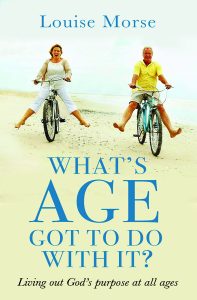 In fifty years’ time there will be more than 20 million people over the age of 65 in the UK, according to the Office for National Statistics, with the biggest bulge in the numbers being people aged over 85. ‘What will that mean for our society?’ asked James, of TransWorld Radio news this morning. Some see it will mean more pressure on a ‘social care system that has been chronically underfunded for years and will not be able to cope,’ says Caroline Abrahams, director of the charity Age UK. Others say the same.[i]
In fifty years’ time there will be more than 20 million people over the age of 65 in the UK, according to the Office for National Statistics, with the biggest bulge in the numbers being people aged over 85. ‘What will that mean for our society?’ asked James, of TransWorld Radio news this morning. Some see it will mean more pressure on a ‘social care system that has been chronically underfunded for years and will not be able to cope,’ says Caroline Abrahams, director of the charity Age UK. Others say the same.[i]
But are they ignoring the fact that longer lives are a sign that people are staying healthier longer? That in 2066 people the 85-pluses will be fitter and more active than those around us today? A government report last year said that ‘Since 2000 to 2002, both life expectancy and healthy life expectancy have increased; the population is now living longer and spending more years in good health.’ [ii]
At a large Christian event last month we heard about an 84 year old who took up sword fencing at 80, and is now champion in four different regions. There are other senior adventurers – the 101 year old expanding her business by buying another sewing machine; children’s book author Judith Kerr publishing a new book at the age of 94, retired art teacher Douglas Higgins writing a book at the age of 100, and many more. Eileen Ash taught Yoga at the age of 104. ‘She said: “I’d like to know when I’m going to be old. Do you think it will be when I’m 105?”
It’s true that we are more likely to get ‘grumbling’ ailments as we age. But even dementia is being pushed back by healthier lifestyles. The number of new cases fell by a fifth over the past 20 years. The percentage of people estimated to have dementia dropped by 24% compared to what had been expected, with some experts suggesting it could be prevented. [iii]
So what will it mean for society, having more older people?
‘There is no typical older person,’ says the World Health Organisation. ‘Some 80-year-olds have levels of physical and mental capacity that compare favourably with 30-year-olds. Others of the same age may require extensive care and support for basic activities like dressing and eating.’ A major factor in preventing frailty in old age is care in the community.
In 50 years’ time if the trajectory of church work and faith groups in the community continues that largely involves older volunteers , it will go a long way to meeting the needs of frailer older people. Befriending schemes are already preventing much loneliness and isolation.
And the other benefits?
Older people are the glue that holds society together, said a WRVS report, ‘Rather than being a ‘drain’ on resources however, WRVS believe older people are a foundation to provide positive economic contribution and social glue to the country. And with this report, we’re showing how they’re doing it already.’[iv]
Seniors have much to offer. God designed old age on purpose, so He could hone the attributes in people that take decades to develop – wisdom, patience, maturity, the ability to take the long view, and more. What it means for our society in 2066 is that everyone will benefit. More silver heads could herald a new golden era.
[i] https://www.telegraph.co.uk/politics/2018/08/13/uk-will-have-9-million-pensioners-50-years-official-figures/
[ii] https://www.gov.uk/government/publications/health-profile-for-england/chapter-1-life-expectancy-and-healthy-life-expectancy
[iii] https://www.theguardian.com/society/2016/apr/19/drop-in-dementia-rates-suggests-disease-can-be-prevented-researchers-say
[iv] https://www.royalvoluntaryservice.org.uk/Uploads/Documents/gold_age_report_2011.pdf















Thank you for that..God Bless you,
Marley